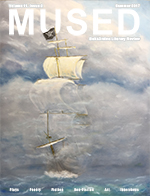The Interpreter
Susan P. Blevins
The nurse ushered David and his wife Margaret, and me, into the rather plush, paneled office of the specialist, with whom David had an appointment.
David and Margaret and I, all ex-pat Brits and very close friends, were living in Rome at the time, and they had asked me to accompany them to this important meeting, to serve as interpreter. David had not been feeling well for some time, just a vague feeling of low energy and the sense that something might be wrong. He had been to his GP, who had performed all manner of tests, and then been advised by him to see the current specialist to interpret the results.
There were only two chairs in front of the doctor’s desk, so I perched on the arm of Margaret’s chair, introducing myself to the doctor, and explaining why I was there. He greeted Margaret and David in rather halting English, and then shuffled his papers around in front of him, clearing his throat at length, before he started to speak. He began by talking about some tests that had gone quite well and were normal, but then his speech slowed, and with great sorrow in his voice, he turned to me and gave me the information he clearly had been steeling himself to provide.
I felt all color ebb from my cheeks as I listened to his words, and my heart was pounding as I turned toward Margaret and David, their upturned faces staring expectantly at me, waiting for the translation of what I had just heard. I willed the lump in my throat to subside, and took some very deep breaths before addressing David.
“The doctor wants me to tell you that you have Stage 4 metastatic liver cancer, David, with probably about three months to live. I am so, so very sorry.”
The expression on their faces will be with me forever. We mumbled our polite English thanks and goodbyes to the doctor, and stumbled in silence from his office. The silence continued as we walked to their car, and also during the ride to their apartment, each one of us assessing the news in our own personal way, wondering what it would entail and how we would cope.
It was relatively easy for me to translate the doctor’s spoken words for them, but how to interpret the tumult of unspoken words that now filled the silence we all shared? How could I tell them that his words translated into a different view of life, a different set of priorities, to a sea change in their relations with others? That time would shrink so that each minute remaining would be precious and significant?
If only I could translate death into life, change the words, and thus change David’s reality. The maelstrom of words milling and colliding in our heads was beyond translation into the inadequate limitations of speech.

